Unit 4 I used to be afraid of the dark-Section B 1a-1e课件(共42张PPT)
文档属性
| 名称 | Unit 4 I used to be afraid of the dark-Section B 1a-1e课件(共42张PPT) | 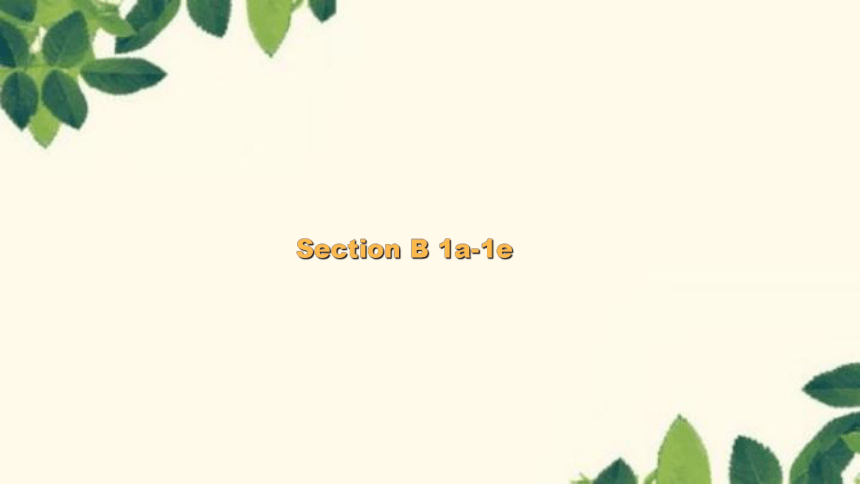 | |
| 格式 | ppt | ||
| 文件大小 | 3.0MB | ||
| 资源类型 | 教案 | ||
| 版本资源 | 人教新目标(Go for it)版 | ||
| 科目 | 英语 | ||
| 更新时间 | 2022-09-13 16:16:15 | ||
图片预览

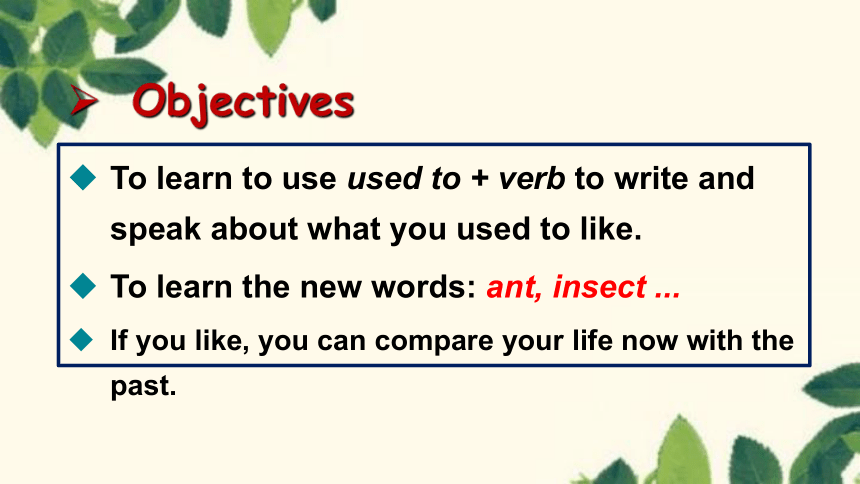
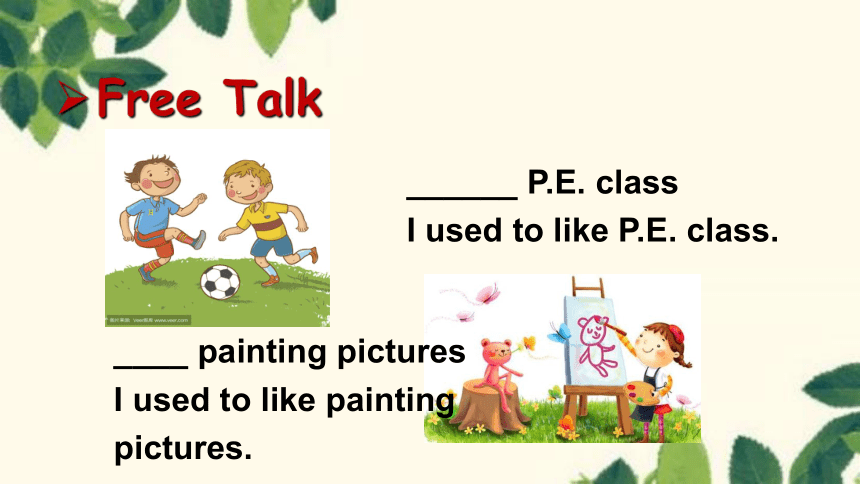
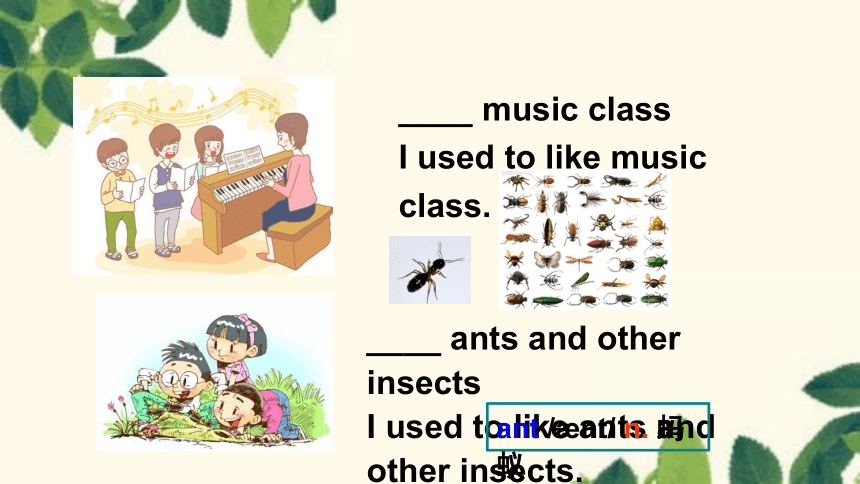
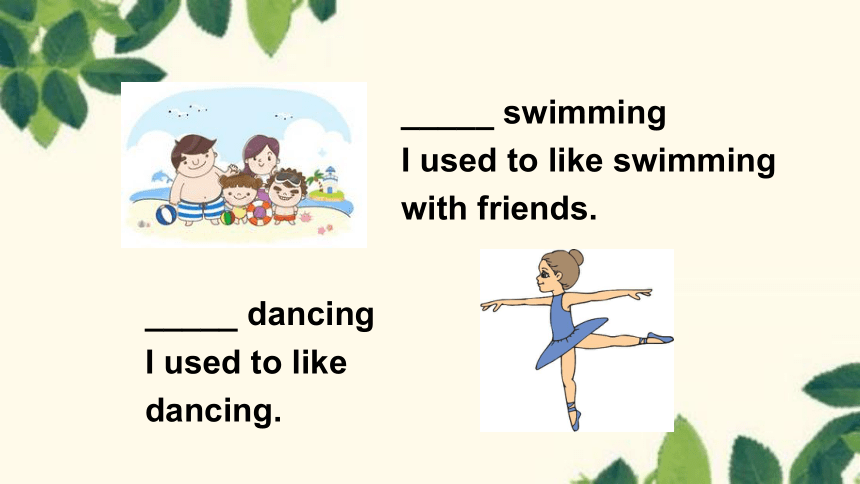
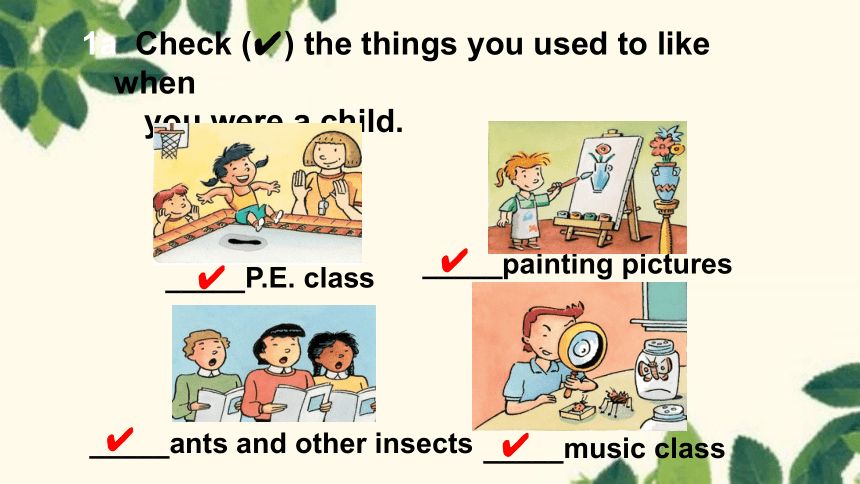
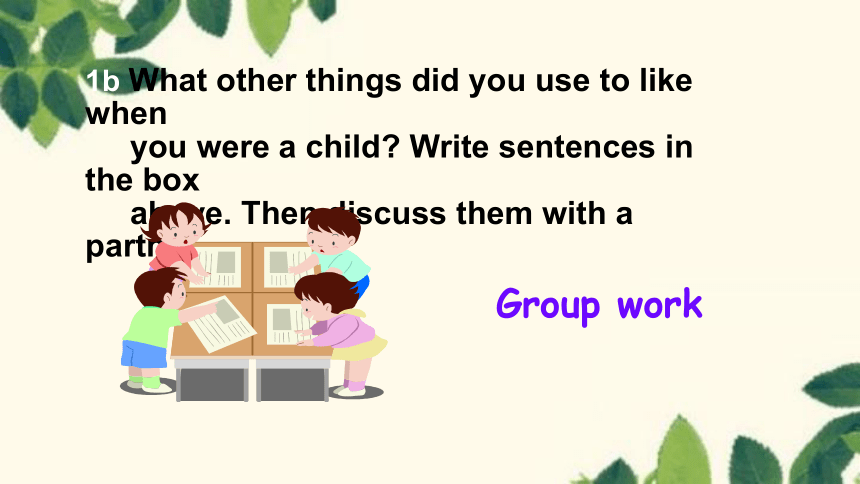
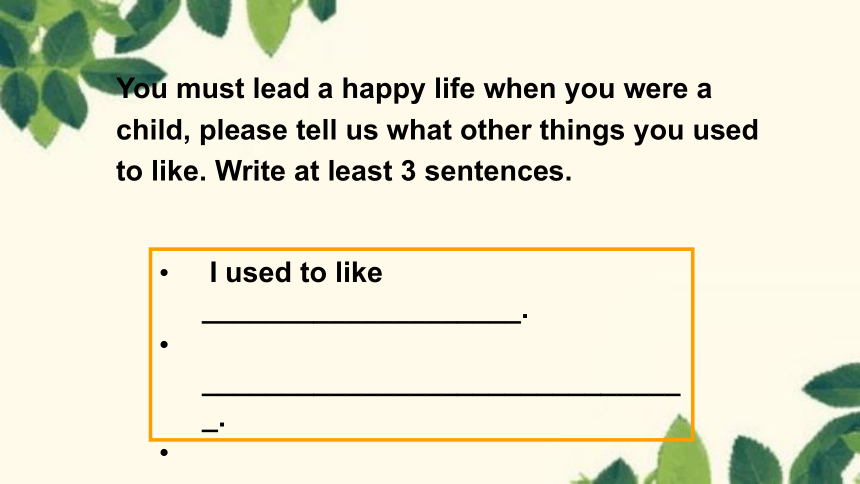
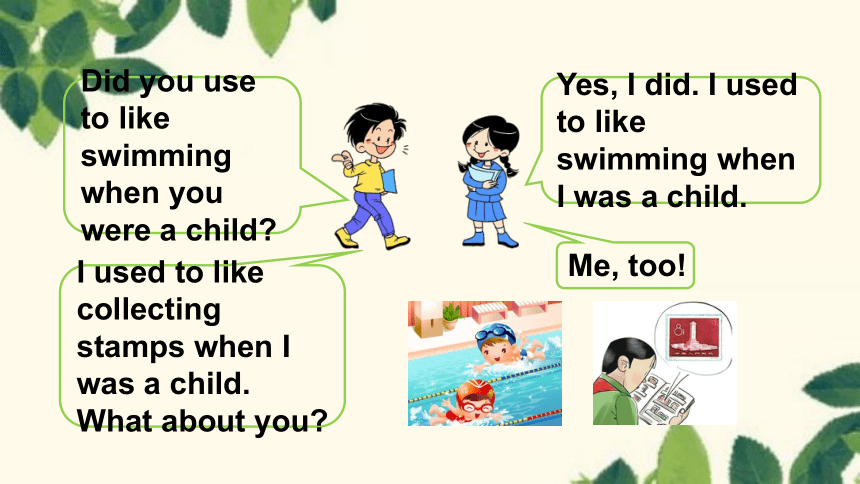
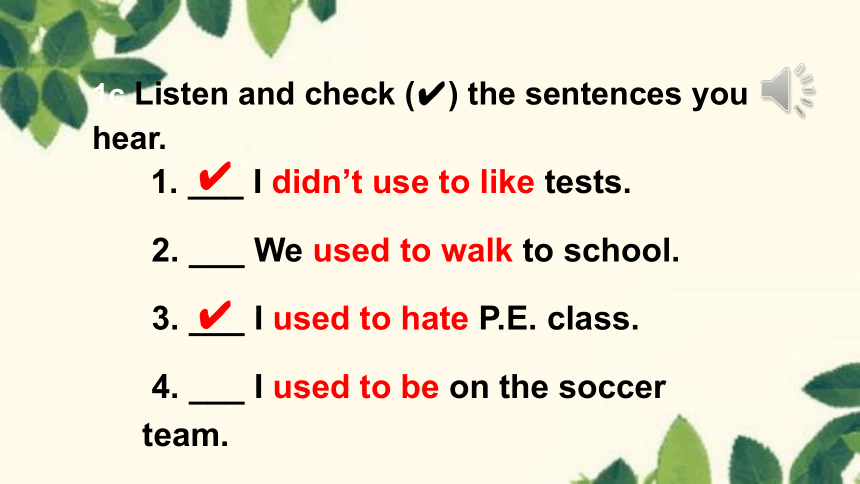
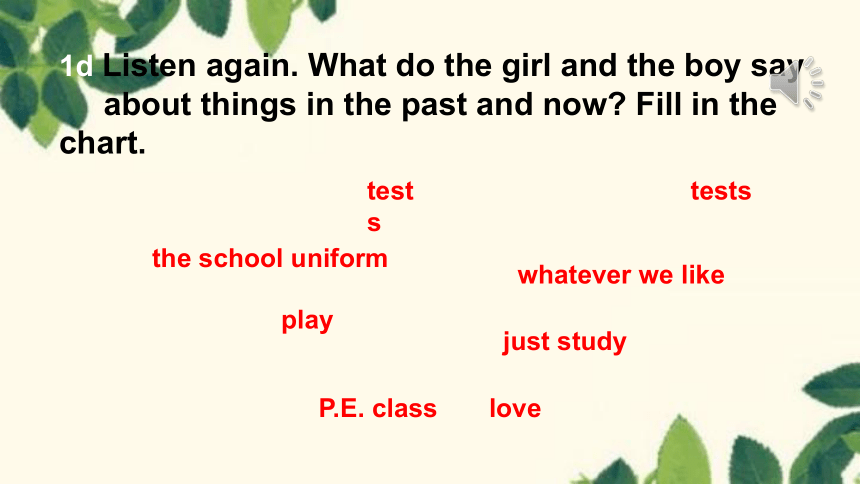
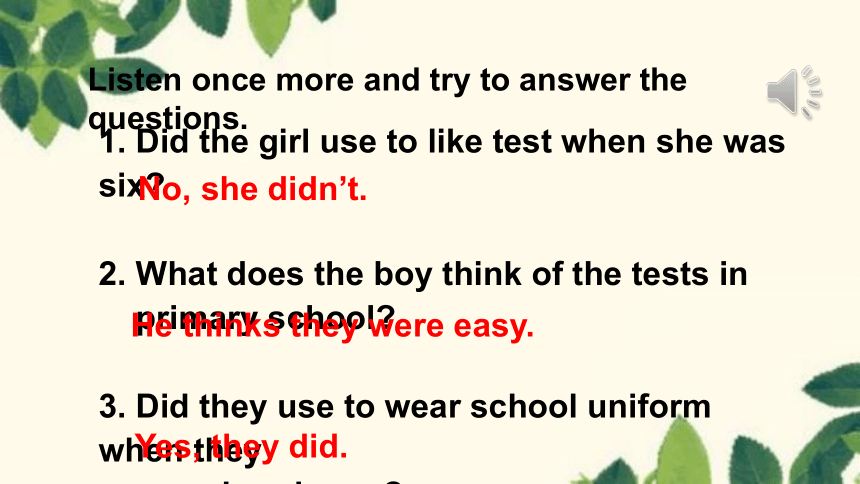
文档简介
(共42张PPT)
Section B 1a-1e
To learn to use used to + verb to write and speak about what you used to like.
To learn the new words: ant, insect ...
If you like, you can compare your life now with the past.
Objectives
______ P.E. class
I used to like P.E. class.
____ painting pictures
I used to like painting pictures.
Free Talk
____ music class
I used to like music class.
____ ants and other insects
I used to like ants and other insects.
ant / nt/ n. 蚂蚁
_____ swimming
I used to like swimming with friends.
_____ dancing
I used to like dancing.
_____P.E. class
1a Check ( ) the things you used to like when
you were a child.
_____music class
_____painting pictures
_____ants and other insects
1b What other things did you use to like when
you were a child Write sentences in the box
above. Then discuss them with a partner.
Group work
You must lead a happy life when you were a child, please tell us what other things you used to like. Write at least 3 sentences.
I used to like ____________________.
_______________________________.
_______________________________.
_______________________________.
_______________________________.
Did you use to like swimming when you were a child
Yes, I did. I used to like swimming when I was a child.
I used to like collecting stamps when I was a child. What about you
Me, too!
1. ___ I didn’t use to like tests.
2. ___ We used to walk to school.
3. ___ I used to hate P.E. class.
4. ___ I used to be on the soccer team.
1c Listen and check ( ) the sentences you hear.
1d Listen again. What do the girl and the boy say
about things in the past and now Fill in the chart.
tests
P.E. class
tests
the school uniform
whatever we like
just study
love
play
1. Did the girl use to like test when she was six
2. What does the boy think of the tests in
primary school
3. Did they use to wear school uniform when they
were in primary
No, she didn’t.
He thinks they were easy.
Listen once more and try to answer the questions.
Yes, they did.
4. What did the boy think of the school uniform
in primary school
5. What did the boy use to hate in primary school
He didn’t mind wearing a school uniform.
He used to hate P.E. class.
A: I used to be nervous about tests all the
time. What about you
B: Yes, me too. And I used to …
Pairwork
1e Compare yourself with your partner.
be nervous about
意为“对……感到紧张”,about 为介词,
后接名词、代词或动词的-ing形式作宾语。
There is nothing to be nervous about.
没什么可紧张的。
I’ll be nervous about speaking in your presence.
有你在场我说话就紧张了。
Language points
辨析: nervous 和 anxious
nervous:在事情发展的过程中有一种怕的感觉
=rather afraid
anxious: 由于害怕某种事情会发生而感到焦急、担心
=worried
I’m always nervous when I have to make a speech.
在必须演讲时我总感到紧张。
Your mother will be anxious until she hears you’re safe.
你妈妈只有在听到你安然无恙时才会放下心来。
Ⅰ. 选择方框内合适的词填空。
painting, team, use, a lot, worry about
1.Tom is good at volleyball and he is on the school_____.
2. Don’t____________ me. I can look after myself.
3. Do you like__________ pictures
4. He usually sleeps_______ on weekends because he is very
tired at school on weekdays.
5. The girl______ to hate animals, but now she loves them.
team
worry about
painting
a lot
used
Exercises
Ⅱ. 完成下列句子。
1.我家曾经住在一个小城市里。
My family _______ ______ live in a small city.
2. 现在她渐渐习惯了在国外生活。
Now, she is getting _______ _____ _______abroad.
3. 我过去总是为成绩焦虑。
I used to ________ _________ ________ all the time.
4. 我弟弟以前参加了学校足球队。
My brother_____ ___ _____ ______the volleyball team.
used to
used to being
be nervous about
used to being on
Ⅲ. 选择。
1. — Your mother plays tennis very often, doesn’t she
— Well, she doesn’t like it now. But she____.
A. wanted to B. would like to
C. used to D. hoped to
2. — I am like a cat on hot bricks. There are so many
problems that I don’t know___ to deal with them.
— Calm down first. Let’s see what I can do for you.
A. what B. why C. who D. how
C
D
Homework
Make conversations with your partner
about what your childhood used to be
like.
To listen to 1c and 1d, then complete them.
To learn new words: pronounce, increase, speed, partner…
Objectives
Do you have difficulties in learning English
What things are difficult for you
Discussion
What’s your problem in learning English How do you solve them
I have difficulties in
learning English.
Can you help me
The difficulties he has in learning English.
New words: can’t pronounce some of the words
spell some English words
Speaking: be afraid to speak
Listening: can’t understand spoken English
Writing: can’t make complete sentences
Reading: read very slowly
Grammar: make mistakes
1a Learning English can be difficult. What things are
difficult for you Read the list. Check ( ) the
statements that are true for you.
____ I can’t pronounce some of the words.(v. 发音)
____ I can’t always understand spoken English.
____ I don’t know how to increase my reading speed.
____ I can’t spell some English words.
____ I often make mistakes in grammar.
(v. 增加;增长)
(n. 速度)
1b What other things are difficult for you
Make a list.
1. I don’t know enough words to write well.
2. ________________________________
3. ________________________________
4. ______________________________
5. ________________________________
can’t get the pronunciation right
be afraid people might laugh at me
forget a lot of new words
don’t get much writing practice
1c Paul finds it difficult to learn English. Listen and
complete the learning challenges he talks about.
1. He can’t get the__________________ right.
2. He___________ a lot of new words.
3. He can’t always_____________ when people talk to him.
4. He doesn’t get much___________ practice.
pronunciation
forgets
understand
writing
Challenges
1d Listen again. Complete the solutions.
1. ________________ can help.
He can always_____________________ in his notebook and study them at home.
He can_____________________________ to practice speaking.
He should find a _______ to practice writing.
Listening
write the new words
join an English language club
pen pal
Solutions
1e Role-play conversations using the information
in 1c and 1d.
① A: I don’t have a partner to practice English with.
B: Maybe you should join an English club.
② A: I always forget the new words.
B: You can write the new words in your notebook
and study them at home.
A: I can’t always understand when people talk to me.
B: Maybe you should join an English language club
to practice speaking.
A: I forget a lot of new words.
B: Maybe you should write the new words in your
notebook and study them at home.
Pair work
1.I often make mistakes in grammar.
mistake n. 错误;过失 make mistakes 犯错
Tom didn’t make a single spelling mistake in his composition. 汤姆在这篇作文里一个字也没拼错。
mistake vt. 弄错,误解
I mistook the number and went to the wrong room. 我记错号码, 走错了房间。
Language points
2. challenge n. 挑战
He wants a career that offers a challenge. 他想要一份有挑战性的事业。
vt. 向……挑战;对……提出异议
I challenged him to show his proof. 我要他拿出证据。
He challenged my view on that matter. 他就我对那件事的看法提出异议。
3. solution n. (问题、疑难等的) 解决;解答
It may take a long time to find a solution to the problem. 也许要花很长时间才能找到解决这个问题的办法。 The solution of the problem requires a lot of time. 解决这个问题需要很多时间。
4. Maybe you should join an English club.
join/join in/take part in
(1) join=be a member of 参加, 指加入某种组织,并成为其中的一员。
join the army / party 入伍/党 join the club 加入俱乐部
join in 后接活动名称
join sb. 加入到某个人群之中
Ⅰ. 用所给词的适当形式填空。
1. Sometimes, I can’t get the____________ (pronounce) right.
2. I don’t know how__________ (improve) my spoken English.
3. The more careful you are, the fewer_________ (mistake)
you’ll make.
4. You can find a pen pal to practice________ (write).
5. She can’t______ (spell) English words.
Exercises
pronunciation
to improve
mistakes
writing
spell
Ⅱ. 用方框中所给单词的适当形式填空。
We must learn to face the __________ in our life.
2. He has trouble in understanding _______ English.
3. Can you think of a good _______ to the problem
4. You can listen to the tapes to get much listening _______.
5. The more careful you are, the fewer _______ you’ll make.
solution, practice, mistake, spoken, challenges
challenges
spoken
solution
practice
mistakes
— Excuse me, can you teach me how to ______
this new word
— No problem. Look at my mouth and listen
carefully.
A. prove B. pronounce
C. prepare D. produce
B
中考链接
证明
准备
发音
生产
你能教给我这个新词怎么样……
— Miss Huang always advises us to practice
speaking English after class.
— She is right. Speaking is an important
language __________.
A. sign B. skill C. suggestion
符号
技能
建议
B
Review the new words and expressions you’ve learned today.
Preview the article How Can You Become a Successful Learner on page 6.
Homework
Section B 1a-1e
To learn to use used to + verb to write and speak about what you used to like.
To learn the new words: ant, insect ...
If you like, you can compare your life now with the past.
Objectives
______ P.E. class
I used to like P.E. class.
____ painting pictures
I used to like painting pictures.
Free Talk
____ music class
I used to like music class.
____ ants and other insects
I used to like ants and other insects.
ant / nt/ n. 蚂蚁
_____ swimming
I used to like swimming with friends.
_____ dancing
I used to like dancing.
_____P.E. class
1a Check ( ) the things you used to like when
you were a child.
_____music class
_____painting pictures
_____ants and other insects
1b What other things did you use to like when
you were a child Write sentences in the box
above. Then discuss them with a partner.
Group work
You must lead a happy life when you were a child, please tell us what other things you used to like. Write at least 3 sentences.
I used to like ____________________.
_______________________________.
_______________________________.
_______________________________.
_______________________________.
Did you use to like swimming when you were a child
Yes, I did. I used to like swimming when I was a child.
I used to like collecting stamps when I was a child. What about you
Me, too!
1. ___ I didn’t use to like tests.
2. ___ We used to walk to school.
3. ___ I used to hate P.E. class.
4. ___ I used to be on the soccer team.
1c Listen and check ( ) the sentences you hear.
1d Listen again. What do the girl and the boy say
about things in the past and now Fill in the chart.
tests
P.E. class
tests
the school uniform
whatever we like
just study
love
play
1. Did the girl use to like test when she was six
2. What does the boy think of the tests in
primary school
3. Did they use to wear school uniform when they
were in primary
No, she didn’t.
He thinks they were easy.
Listen once more and try to answer the questions.
Yes, they did.
4. What did the boy think of the school uniform
in primary school
5. What did the boy use to hate in primary school
He didn’t mind wearing a school uniform.
He used to hate P.E. class.
A: I used to be nervous about tests all the
time. What about you
B: Yes, me too. And I used to …
Pairwork
1e Compare yourself with your partner.
be nervous about
意为“对……感到紧张”,about 为介词,
后接名词、代词或动词的-ing形式作宾语。
There is nothing to be nervous about.
没什么可紧张的。
I’ll be nervous about speaking in your presence.
有你在场我说话就紧张了。
Language points
辨析: nervous 和 anxious
nervous:在事情发展的过程中有一种怕的感觉
=rather afraid
anxious: 由于害怕某种事情会发生而感到焦急、担心
=worried
I’m always nervous when I have to make a speech.
在必须演讲时我总感到紧张。
Your mother will be anxious until she hears you’re safe.
你妈妈只有在听到你安然无恙时才会放下心来。
Ⅰ. 选择方框内合适的词填空。
painting, team, use, a lot, worry about
1.Tom is good at volleyball and he is on the school_____.
2. Don’t____________ me. I can look after myself.
3. Do you like__________ pictures
4. He usually sleeps_______ on weekends because he is very
tired at school on weekdays.
5. The girl______ to hate animals, but now she loves them.
team
worry about
painting
a lot
used
Exercises
Ⅱ. 完成下列句子。
1.我家曾经住在一个小城市里。
My family _______ ______ live in a small city.
2. 现在她渐渐习惯了在国外生活。
Now, she is getting _______ _____ _______abroad.
3. 我过去总是为成绩焦虑。
I used to ________ _________ ________ all the time.
4. 我弟弟以前参加了学校足球队。
My brother_____ ___ _____ ______the volleyball team.
used to
used to being
be nervous about
used to being on
Ⅲ. 选择。
1. — Your mother plays tennis very often, doesn’t she
— Well, she doesn’t like it now. But she____.
A. wanted to B. would like to
C. used to D. hoped to
2. — I am like a cat on hot bricks. There are so many
problems that I don’t know___ to deal with them.
— Calm down first. Let’s see what I can do for you.
A. what B. why C. who D. how
C
D
Homework
Make conversations with your partner
about what your childhood used to be
like.
To listen to 1c and 1d, then complete them.
To learn new words: pronounce, increase, speed, partner…
Objectives
Do you have difficulties in learning English
What things are difficult for you
Discussion
What’s your problem in learning English How do you solve them
I have difficulties in
learning English.
Can you help me
The difficulties he has in learning English.
New words: can’t pronounce some of the words
spell some English words
Speaking: be afraid to speak
Listening: can’t understand spoken English
Writing: can’t make complete sentences
Reading: read very slowly
Grammar: make mistakes
1a Learning English can be difficult. What things are
difficult for you Read the list. Check ( ) the
statements that are true for you.
____ I can’t pronounce some of the words.(v. 发音)
____ I can’t always understand spoken English.
____ I don’t know how to increase my reading speed.
____ I can’t spell some English words.
____ I often make mistakes in grammar.
(v. 增加;增长)
(n. 速度)
1b What other things are difficult for you
Make a list.
1. I don’t know enough words to write well.
2. ________________________________
3. ________________________________
4. ______________________________
5. ________________________________
can’t get the pronunciation right
be afraid people might laugh at me
forget a lot of new words
don’t get much writing practice
1c Paul finds it difficult to learn English. Listen and
complete the learning challenges he talks about.
1. He can’t get the__________________ right.
2. He___________ a lot of new words.
3. He can’t always_____________ when people talk to him.
4. He doesn’t get much___________ practice.
pronunciation
forgets
understand
writing
Challenges
1d Listen again. Complete the solutions.
1. ________________ can help.
He can always_____________________ in his notebook and study them at home.
He can_____________________________ to practice speaking.
He should find a _______ to practice writing.
Listening
write the new words
join an English language club
pen pal
Solutions
1e Role-play conversations using the information
in 1c and 1d.
① A: I don’t have a partner to practice English with.
B: Maybe you should join an English club.
② A: I always forget the new words.
B: You can write the new words in your notebook
and study them at home.
A: I can’t always understand when people talk to me.
B: Maybe you should join an English language club
to practice speaking.
A: I forget a lot of new words.
B: Maybe you should write the new words in your
notebook and study them at home.
Pair work
1.I often make mistakes in grammar.
mistake n. 错误;过失 make mistakes 犯错
Tom didn’t make a single spelling mistake in his composition. 汤姆在这篇作文里一个字也没拼错。
mistake vt. 弄错,误解
I mistook the number and went to the wrong room. 我记错号码, 走错了房间。
Language points
2. challenge n. 挑战
He wants a career that offers a challenge. 他想要一份有挑战性的事业。
vt. 向……挑战;对……提出异议
I challenged him to show his proof. 我要他拿出证据。
He challenged my view on that matter. 他就我对那件事的看法提出异议。
3. solution n. (问题、疑难等的) 解决;解答
It may take a long time to find a solution to the problem. 也许要花很长时间才能找到解决这个问题的办法。 The solution of the problem requires a lot of time. 解决这个问题需要很多时间。
4. Maybe you should join an English club.
join/join in/take part in
(1) join=be a member of 参加, 指加入某种组织,并成为其中的一员。
join the army / party 入伍/党 join the club 加入俱乐部
join in 后接活动名称
join sb. 加入到某个人群之中
Ⅰ. 用所给词的适当形式填空。
1. Sometimes, I can’t get the____________ (pronounce) right.
2. I don’t know how__________ (improve) my spoken English.
3. The more careful you are, the fewer_________ (mistake)
you’ll make.
4. You can find a pen pal to practice________ (write).
5. She can’t______ (spell) English words.
Exercises
pronunciation
to improve
mistakes
writing
spell
Ⅱ. 用方框中所给单词的适当形式填空。
We must learn to face the __________ in our life.
2. He has trouble in understanding _______ English.
3. Can you think of a good _______ to the problem
4. You can listen to the tapes to get much listening _______.
5. The more careful you are, the fewer _______ you’ll make.
solution, practice, mistake, spoken, challenges
challenges
spoken
solution
practice
mistakes
— Excuse me, can you teach me how to ______
this new word
— No problem. Look at my mouth and listen
carefully.
A. prove B. pronounce
C. prepare D. produce
B
中考链接
证明
准备
发音
生产
你能教给我这个新词怎么样……
— Miss Huang always advises us to practice
speaking English after class.
— She is right. Speaking is an important
language __________.
A. sign B. skill C. suggestion
符号
技能
建议
B
Review the new words and expressions you’ve learned today.
Preview the article How Can You Become a Successful Learner on page 6.
Homework
同课章节目录
- Unit 1 How can we become good learners.
- Section A
- Section B
- Unit 2 I think that mooncakes are delicious!
- Section A
- Section B
- Unit 3 Could you please tell me where the restroom
- Section A
- Section B
- Unit 4 I used to be afraid of the dark.
- Section A
- Section B
- Unit 5 What are the shirts made of?
- Section A
- Section B
- Review of Units 1-5
- Unit 6 When was it invented?
- Section A
- Section B
- Unit 7 Teenagers should be allowed to choose their
- Section A
- Section B
- Unit 8 It must belong to Carla.
- Section A
- Section B
- Unit 9 I like music that I can dance to.
- Section A
- Section B
- Unit 10 You're supposed to shake hands.
- Section A
- Section B
- Review of Units 6-10
- Unit 11 Sad movies make me cry.
- Section A
- Section B
- Unit 12 Life is full of the unexpected
- Section A
- Section B
- Unit 13 We're trying to save the earth!
- Section A
- Section B
- Unit 14 I remember meeting all of you in Grade 7.
- Section A
- Section B
- Review of Units 11-14
